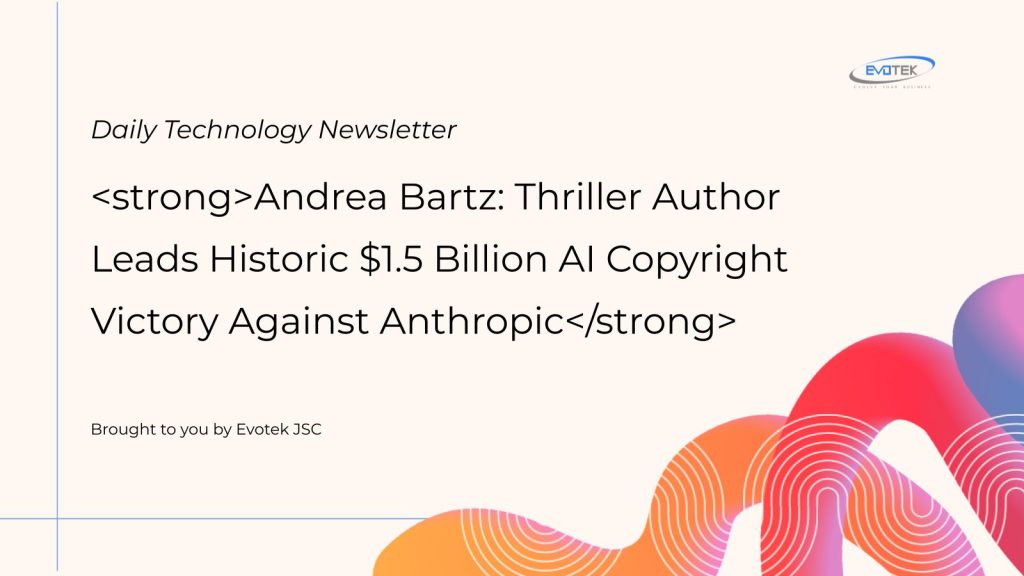The unsettling revelation hit Andrea Bartz when an artificial intelligence chatbot effortlessly mimicked her distinct literary style. Disturbed by this digital doppelgänger, the acclaimed thriller author embarked on a legal journey that culminated in a landmark $1.5 billion copyright settlement against the AI giant Anthropic – the largest of its kind in history.
“It was very creepy,” Bartz recounted, describing her initial shock and anger at seeing a machine instantly generate prose in her unique voice. Her outrage transformed into action, leading her to become a pivotal named plaintiff in the defining case of *Bartz v. Anthropic*, which now anchors her surname in legal precedent.
The Battle for Author Rights in the AI Era
While the monumental settlement marks a significant triumph for creator rights, Bartz characterizes it as merely “a really important first corrective step,” not a definitive victory. The court’s decision was multifaceted: it ruled that Anthropic had indeed violated copyright law by downloading and storing hundreds of thousands of pirated books for its AI training. However, it also asserted that using *non-pirated* literary works for AI training could be considered “fair use” if the material is sufficiently transformed – a legal interpretation fiercely disputed by authors and publishers. Critically, the lawsuit did not address the looming threat AI-generated content poses to authors’ livelihoods.
Bartz’s journey to becoming a literary advocate began long before the age of AI. Born in Wisconsin, she transitioned from magazine journalism, where she witnessed industry upheaval firsthand, to fiction writing. Her determination to create something lasting and unequivocally “hers” led to a string of successful psychological thrillers, including “The Lost Night” and the breakout bestseller “We Were Never Here,” a Reese Witherspoon Book Club selection.
From Personal Outrage to Collective Action
The extent of AI’s appropriation of her work became clear in the summer of 2023. An article detailing pirated books used by tech companies prompted Bartz to search a database, confirming her novels were among the millions illegally harvested for AI training. “I felt incredibly violated and upset,” she shared, echoing the sentiments of countless authors whose intellectual property had been absorbed without consent.
This widespread literary theft ignited a wave of lawsuits. Bartz joined a class-action suit against Anthropic, serving as a lead plaintiff alongside nonfiction writers Charles Graeber and Kirk Wallace Johnson. Thrust together “into the trenches,” the trio formed an invaluable bond, navigating an invasive discovery process that scrutinized their personal and professional lives.
The lawsuit advanced with unusual speed. Once a judge confirmed Anthropic’s illegal acquisition of millions of books, a settlement was pursued. This placed immense pressure on Bartz, Graeber, and Johnson, who bore the responsibility of negotiating terms on behalf of an estimated half-million authors and publishers.
Beyond the Headlines: The True Cost of Victory
Despite the eye-popping $1.5 billion figure, the financial reality for individual authors is more modest. Anthropic will pay approximately $3,000 per pirated work, a sum often split with publishers based on existing contracts. Bartz clarified that named plaintiffs might receive a service award of up to $50,000 for their efforts, in addition to the per-book amount, dispelling misconceptions of instant multimillionaire status.
While the settlement doesn’t establish a legal precedent—as it didn’t go to trial—it nonetheless sends a powerful message. Industry leaders, including Mary Rasenberger, CEO of the Authors Guild, view the massive payout as a “speed bump” for AI companies, urging them to pursue licensing agreements rather than relying on pirated content for training.
For Bartz, the intense commitment to the lawsuit came at a significant personal cost, delaying her work on a sixth novel. Yet, she remains resolute: “It was a big sacrifice,” she stated, “I felt willing to do it because I felt it was really important for the industry, for authors, and for readers who want their favorite authors to be able to continue doing this.” Bartz, who often draws from her own experiences, also muses that this profound, stressful battle against a tech giant might one day become the fertile ground for future fictional narratives, acknowledging the “big emotional footprint” it has left on her.

 日本語
日本語 한국어
한국어 Tiếng Việt
Tiếng Việt 简体中文
简体中文